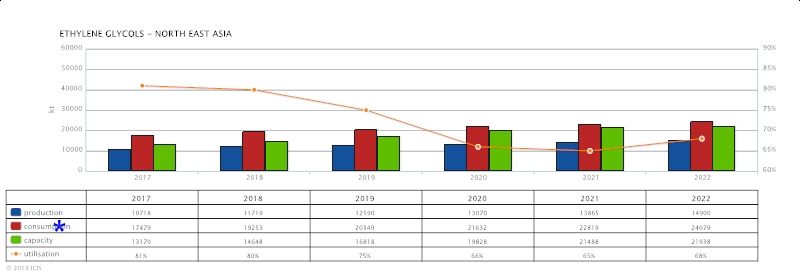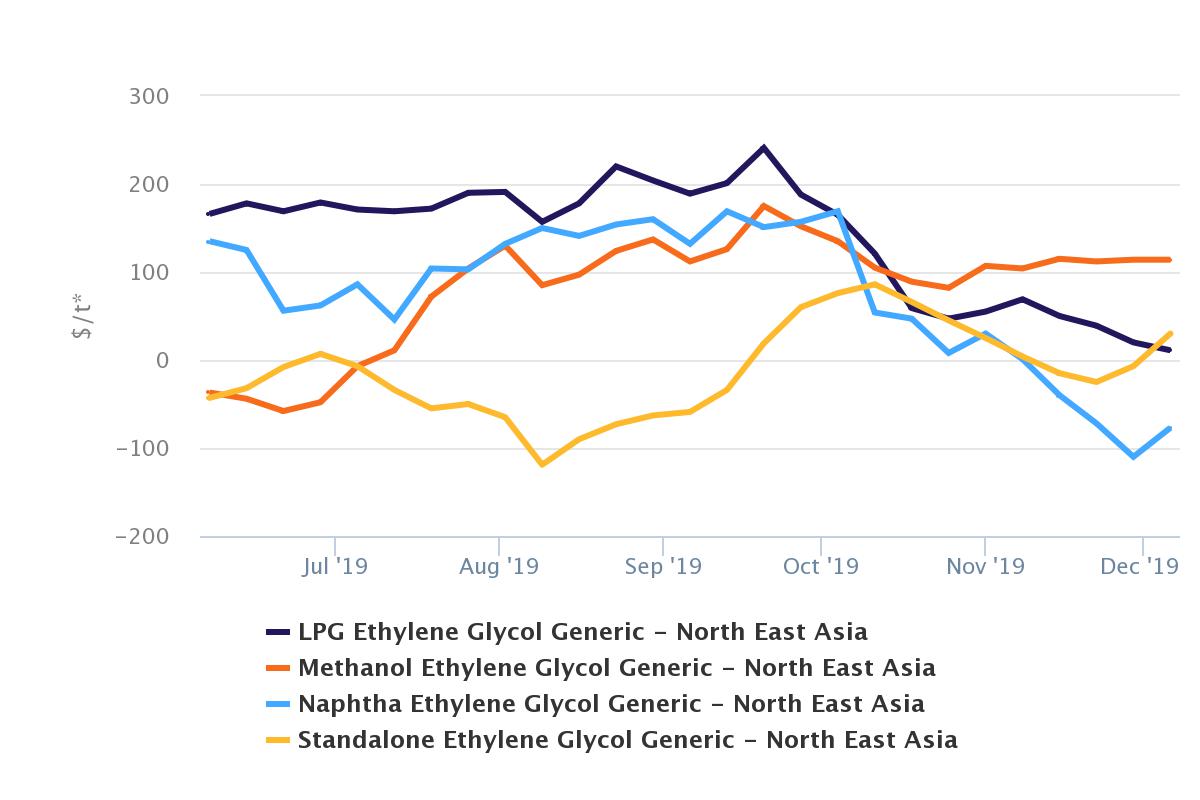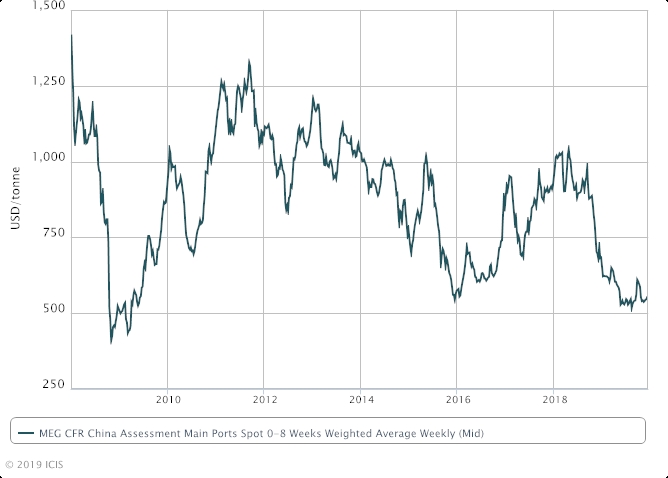OUTLOOK ’20: Asia MEG faces a difficult year as mega projects come on line
Abstract
SINGAPORE (ICIS)--Asia’s monoethylene glycol (MEG) market will face a difficult year in 2020 due to peak start-ups of several new mega units while China’s import volumes would fall because of rising local supply.



Rising new capacities with no corresponding strong increase in demand will lead to falling operating rates at plants.
A total of 3.3m tonnes/year of confirmed new
MEG capacities in Asia are expected to start up
from end-2019 to 2020, which will weigh on a
market already plagued by poor
margins.
In China, Hengli Petrochemical’s 900,000 tonne/year and Zhejiang Petrochemical’s 750,000 tonne/year plants are due to begin production in the second-half December 2019, although commercial operation will have to wait until next year.
Hengli Petrochemical’s second MEG unit with the same capacity is also due for commissioning within 2020, according to a company source.
In southeast Asia, the start-up of a 750,000 tonne/year joint-venture unit between PETRONAS and Saudi Aramco will likely be delayed to 2020 due to some mechanical issue, market sources said.
“These are only mega units which will come up next year, not to mention the small ones [coal-based] in China. A tough year will be coming in 2020 as so many big plants will come on stream together,” a regional trader said.
Total MEG capacity in northeast Asia will rise by 18% to 19.83m tonnes in 2020, according to ICIS Supply and Demand Database.
“The downstream demand expansion will be definitely lagging behind the fast supply growth amid the global economic downturn,” a market participant said, adding that suppliers will have to run their units at reduced rates in 2020.
Given increasing supply, MEG producers in northeast Asia may have to cut operating rates at their plants to balance the market amid weak demand.
Plant utilization rate in the region is projected to fall to 66% in 2020 from 75% in 2019, according to ICIS Supply and Demand Database.
CHINA IMPORTS TO FALL AS LOCAL SUPPLY
GROWS
China is the world’s largest MEG importer with
annual imports pegged at more than 7.5m tonnes
in the past five years.
Increased availability of the material in the domestic market may see the country’s MEG intake fall next year.
“China’s MEG self-sufficiency rate is going up. The imports have a big chance to fall in 2020, which may force overseas producers, especially Middle East producers to think how they should divert their cargoes to if [the] China market does not need many cargoes as before,” a major Chinese producer said.
In January to October 2019, China imported 8.23m tonnes of MEG, down from 8.30m tonnes in the same period in 2018, ICIS data showed.
China’s volume intake has slipped while India’s import appetite for the same material has increased.
India posted a 13% year-on-year growth in MEG imports in the January-September 2019 period to 565,888 tonnes.
At the ongoing discussions for 2020 term contracts in Asia, Chinese end-users have more bargaining power and are requesting bigger discounts, while suppliers were not keen to compromise.
“If they [overseas producers] still want to keep their market share in China in 2020, they have to give more discounts,” a Chinese trader said.
CHINA INVENTORY TO RISE AHEAD OF LUNAR
NEW YEAR
MEG inventories at Chinese ports in the week
ended 6 December 2019 fell to a two-year low of
429,000 tonnes, from a high of 1.38m tonnes in
April 2019, as a result of global supply cuts
and delayed arrivals of import cargoes.
However, the inventories will gradually build up amid slowing offtake rates with the approach of the Lunar New Year holiday, which will fall in late January.
China markets close for a full week for the Lunar New Year celebration, thus keeping buying interest for January cargoes subdued.
“Downstream converters which are reeling from the ongoing [US-China] trade war will wrap up their orders in early January due to an earlier Lunar New Year holiday, after that, factories will close and workers will go home to celebrate the holiday,” a downstream end-user said.
Spot MEG prices in Asia plunged to a 10-year low in August 2019 caused by a combination of falling cost pressure amid a plunge in crude prices and growing ethylene supply, and sluggish demand.
A gradual recovery started in mid-November as inventories at Chinese port started falling, but the price uptrend was limited given a gloomy outlook on the market.
Focus article and interactive content byJudith Wang
SHARE THIS STORY
Information comes from Internet sources
